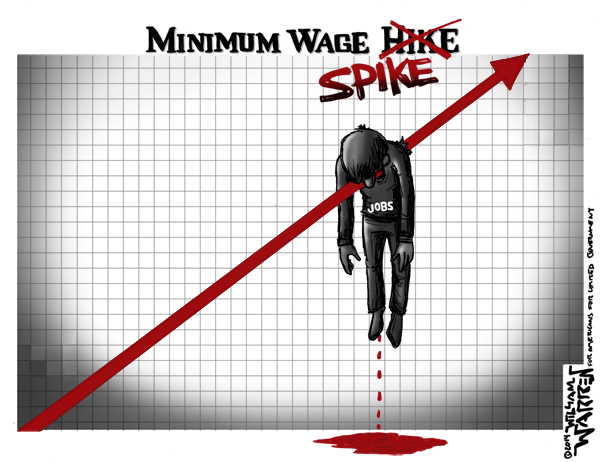By Rick Manning
As originally published at Investor’s Business Daily.
It is official.
Inflation for 2018 settled in at 1.9 percent for the year, with just 0.8 percent of that in the final six months of the year. Real wages for 2018 increased measured against inflation increased by $4.39 a week. This means that if inflation and wage increases are equal in 2019, the average worker will make $228.28 more in 2019 than last year. And this is without adding in the benefits of the tax cut.
Why does this matter?
Because economic growth doesn’t typically occur in massive spurts, but instead shows up in people’s paychecks three to five dollars a week at a time. And while people appreciate it when they pay less at the pump for gasoline, the prices vary from week to week and are hard to calculate into our personal budgets.
But when the average wage earner sees his or her overall take home pay increase gradually, they find themselves with enough money to not feel so stressed at the end of each month. They can then begin thinking about growing their family, putting aside something for the future or even going on a delayed trip.
Wage Hikes Already Here
This same impact is felt when Americans believe that they can afford to quit a job they hate before finding a new one to replace it. The market creates increased or decreased demand for labor and it is that demand which naturally increases or decreases wages. This freedom effect is being felt in the economy and the free flow of labor is what causes competition between employers for workers and increases in wages and benefits to attract and keep good people.
An example can be found in Williston, North Dakota, which is the heart of the Bakken Oil field. In a February 13, 2013 article titled, “Minimum Wage Increase: The bad idea that just won’t die“, I wrote that the local McDonald’s in that North Dakota town was hiring for $11 an hour, far above the $7.35 minimum wage.”
The reason for that differential was that the town was booming and the competition for people to do entry level labor was heavy, so the Golden Arches needed to pay more, and charge more for a Big Mac to accommodate that increased labor cost.
Today, that same crew member job is being offered for $12 an hour as the small-town McDonald’s remains in heavy competition for labor in light of the ongoing shale oil boom in the area.
Back in Washington, D.C., the know-it-alls on the left have a different idea. They believe that the national minimum wage should be $15 an hour regardless of what market you live in and how much the public will pay for a hamburger, fried chicken or pizza.
Half A Million Jobs Destroyed
The non-partisan Congressional Budget Office has estimated that this mandate will eliminate half a million jobs for entry level job seekers. To put that in perspective, the city of Atlanta, Georgia has fewer than 500,000 residents, so imagine all of them suddenly going from employed to unemployed.
And it is reasonable to argue that the CBO is being very conservative in this estimate. Anyone who has ordered from the counter at a McDonald’s recently has encountered a new electronic board which allows you to place your order using its touch screen. The company has also implemented remote ordering by mobile phone for both contracted-out delivery and pick-up.
So, even without a $15 an hour mandate, jobs which used to be available for kids trying to get skills, Moms re-entering the workforce as their kids go to school and seniors looking to pad their retirement savings are being automated out of existence.
Seattle, Washington is one of the far left cities that jumped on the $15 an hour bandwagon, and the Washington Post reported in 2017 that a study by the National Bureau of Economic Research, “The costs to low-wage workers in Seattle outweighed the benefits by a ratio of three to one.”
Minimum Wage, Opportunity Killer
Interestingly, the study found that employers in Seattle chose to hire higher skilled workers deeming them more likely to help make a profit by increasing productivity over the entry level workers they replaced. The clear result is that those who rely upon entry level jobs to begin their pathway into the labor market are adversely impacted by higher minimum wages.
One of the study authors, Jacob Vigdor of the University of Washington concluded, “Basically, what we’re doing is we’re removing the bottom rung of the ladder.”
Not exactly what the advocates of a $15 minimum wage are promising from Washington, D.C. Perhaps it is time they look at Williston, North Dakota where McDonald’s employees are paid well above the current minimum wage due to labor supply and demand, or even further west where in Seattle, the very people the newly fashionable socialist party in Congress claims to want to help are being kicked out of the labor pool altogether.
At a time when real wages are rising due to actual market forces, there is no need for Congress to artificially distort labor costs and destroy hope among those who are just trying to get started in life by getting that first gateway job.
Rick Manning is the President of Americans for Limited Government and a former Labor Department official in the George W. Bush administration.







